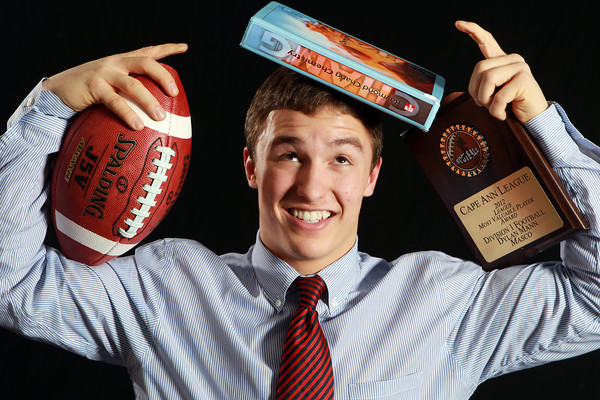The Truth About Being a Student-Athlete

Photo courtesy of Salem News Student-Athlete Nominee Dylan Mann, Masconomet Regional High School.
Introduction
Only student-athletes truly understand the stress that is put on one. It is difficult to balance playing and excelling in their sport, going to school, doing homework, practicing outside of school time, club teams, going to work, and finding time for a social life. Being a student-athlete is a blessing and a curse in itself.
There are advantages such as it can teach skills to help with a student-athletes daily life. There are also disadvantages of being a student-athlete, such as mental and physical health rapidly decreasing as the season goes on if it is not treated. The common cliché, “the struggle is real” is accurate for student-athletes.
Advantages of Being a Student-Athlete
It never ceases to amaze us how well a person can balance school work, their reputation, and their sport all at once. Behind all that toughness, there is a bit of struggle. On the other hand, it would be accurate to say that student-athletes have many important skills that can be used in their daily lives—such as time management skills, healthy eating habits, good study techniques, being a team player, responsibility, good communication skills, and leadership skills.
A direct statement from Roxbury softball student-athlete, Kendall Fehsal states, “It takes responsibility to be a student-athlete. You have to be responsible for managing your time. It is the most critical thing. You also definitely have to pay more attention in class because you might not always have so much time to study while trying to be healthy by sleeping and eating correctly.” Another great piece of wisdom from Delaney Scalera states, “You have to make sure that you’re doing your homework, have good grades, and have a good representation of the team. You can not have a failing grade, or you will not play, and you always need to have a good attitude even on your worst days.” Not only are you gaining life skills and friendships, but you are also playing the sport you are passionate about.
Pressures of Being a Student-Athlete
As discussed prior, there is an immense amount of pressure that comes from being a student-athlete and a lot of skill it takes to be one. Student-athletes are consistently bombarded with practices, games, homework, tests, etc. Still, they are required to accomplish all the tasks listed to become a successful athlete and student. Unfortunately, there is a lot of stress put on an athlete’s performance; from their point of view, it may feel like the end of the world if they did not play well, but in reality, it’s not.
In a survey where I asked student-athletes if they have ever felt overwhelmed after not performing well in a game, 10 out of the 15 students answered “yes” to feeling overwhelmed. One student answered, “One time I was at the point of tears and exhaustion.” This is not healthy. Administrations in most schools are very understanding of this problem. There have been attempts in creating a less intense athletic culture by setting up free counseling specifically for student-athletes. Ethan Hamilton, Athletic Director at Point Loma Nazarene University stated, “We still have expectations if you’re going to be part of a team, but we as coaches and administrators try to be careful and cognizant that playing a sport is at least a part-time job, if not more, in addition to going to school full-time.” As you can see, there is concern about student-athletes’ health along with their social life.
A Student-Athlete’s Mental and Physical Health
A person’s well-being can be affected by being a student-athlete, not only their mental health but their physical health, too. Most of the time, if there is not a safe or caring environment developed for these student-athletes, they will leave due to burnout. Burnout, or overtraining syndrome, is a condition in which athletes experience fatigue and declining performance in his or her sport despite the increase of training. Symptoms of this condition include a major decrease in motivation, mood changes, frequent injuries, and worst of all, falling out of love with their sport (www.luriechildrens.org).
From unique stress factors, most student-athletes develop anxiety, depression, or psychological problems. An American study with student-athletes participating in the NCAA athletic programs found that “of these student-athletes, 10 to 15 percent will experience psychological issues severe enough to warrant counseling,” (https://believeperform.com). Frequently, athletes won’t seek out help for the fear of appearing weak or losing respect from their teammates or peers. Still, it is advised to seek professional help if you feel yourself burning out, depressed, having anxiety attacks, or just needing someone to talk to about your issues.
COVID-19’s Affect on Student-Athletes
The Pandemic was a challenging time for the whole world, but many questioned, “What about sports?” This rough patch was mentally draining for some, but not all student-athletes. The NCAA student-athlete well-being survey opened during the Pandemic from April 10, 2020, to May 1, 2020. The results showed, “82% of respondents reported feeling positive or very positive about the support they are receiving from their coaches. Over a third of respondents reported experiencing sleep difficulties, while more than a quarter reported feeling sadness and a sense of loss, and 1 in 10 reported feeling so depressed it has been difficult to function “constantly” or “almost every day,” (www.ncaa.org).
This is understandable as, due to the Pandemic, the course of learning has changed drastically because most students have to learn virtually. For example, not only do students find themselves with a boatload of work, but they have to learn the material through a computer screen.
Athletes have to take safety precautions, which can be hard to do with a team. A field hockey and lacrosse student-athlete, Delaney Scalera stated, “At the beginning of COVID-19, it was really negative, we didn’t have time to do group practices and when we did, we had to be socially distanced. We still follow all the COVID-19 precautions now, but we will be next to each other or have our masks off while playing on the field. It is definitely still affecting us, but we’re getting through it.” Many have taken COVID-19 restrictions as an opportunity to work on themselves, but some have not been able to see the positivity out of a Pandemic and restrict themselves from becoming a better athlete or student.
Tips and Tricks
A helping hand is always great in stressful situations, like the one’s student-athletes go through everyday. Tips and tricks consist of, getting a hobby, talking it out, not making your sport the only thing in your life, accepting bad things are going to happen, having a cheat day, etc. Getting a hobby can be a nice getaway from a student-athlete’s athletic and school life, it can be used to focus on something fun. Talking it out can help deal with any struggles a student-athlete may be feeling, and it can help them conquer those feelings. Making your sport the most important thing in your life can be exhausting. Remember, life still goes on without us, and you don’t want to miss it.
Nobody is perfect. It is okay to make mistakes, as long as you learn from those mistakes and let them go. A little secret for all student-athletes is that it’s okay to have a cheat day, go grab some ice cream with friends or order a pizza for yourself. Having a strict diet can be stressful; letting loose for one day a month will not damage your physique.
Student-athlete Kendall Fehsal offers a few tips on how to survive life as a student-athlete, “staying focused, doing your homework, training hard, keeping track of time, and being responsible with your social life.” Delaney Scalera adds, “Do not put any more stress on yourself than you need to. To be honest, it is all really a mind game, and I would say do not get so in your head that you become overwhelmed. Lastly, I would say to think about the positives, even if it is a bad day, have that bad day and come back at 100% the next day.” With luck, these tips and tricks will help student-athletes or others looking to catch a break.
Conclusion
In conclusion, there are many ups and downs to being a student-athlete. You require passion, a strong mental state, confidence, a good attitude on and off the field or court, good grades, respect, and the hunger to be the greatest. There will be setbacks and hardships along the way of becoming a successful student-athlete that will need to be overcome. The real hope is all your hard work, training, and studying will pay off one day. Looking back at yourself, knowing that you worked hard for everything you deserved is an accomplishment in itself. Happiness and success are all a student-athlete can aspire to achieve, the real question is are you willing to do it all?

Angelina Guancione is currently a senior at Roxbury High School and is an aspiring writer/journalist. She has been jotting down stories and articles since...










